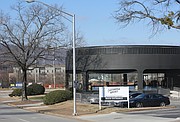A city-backed plan to utilize $4 million in tax money to build a road and subsidize housing at the privately owned Cameron Harbor development downtown hit at least a temporary stumbling block Monday.
The city's Industrial Development Board decided not to vote on two key steps in the plan and to consult with the state after critics warned that moving the process forward without state approval might violate Tennessee law, among other potential legal problems.
The city wants to extend M.L. King Boulevard across Riverfront Parkway and create an attractive gateway to the Tennessee Riverwalk. A 30-foot-wide access road, Ninth Avenue, that now leads to the Blue Goose Hollow trailhead would be removed.
The plan means driving a road across a key piece of the fast-growing Cameron Harbor development.
Rather than use cash, the city is seeking a tax increment financing agreement that would let the developer build the road and pay for it with property tax money generated from the increased value of four buildings planned or underway at Cameron Harbor.
The $4 million plan calls for subsidized "workforce" housing among the homes and townhouses at Cameron Harbor, and includes funds for work related to the continued build-out of the high-end development.
Chattanooga's Industrial Development Board was set to vote on whether to accept an economic impact analysis and a development and financing agreement with developer Evergreen Real Estate. That vote must take place before the TIF proposal can go to the Chattanooga City Council and Hamilton County Commission for their votes.
But at a public hearing Monday, critics decried using public money for private development and warned of legal problems, including the need for state pre-approval and questions about the public notice process for the hearing.
Public watchdog group Accountability for Taxpayer Money said the city should use cash from the Alstom settlement or hotel-motel tax receipts for the project. The developer, Evergreen Real Estate, projects the M.L. King project would cost about $2.8 million.
"We're giving up millions of dollars this way," said Franklin McCallie, with ATM. "I'm not sure why we in Chattanooga keep handing [property tax breaks] to developers. Why do we give up money when we don't have to?"
Attorney John Konvalinka, who was there with ATM founder Helen Burns Sharp, quoted Tennessee law on TIFs as saying a proposed use of public money for private benefit must be approved by the state commissioner of economic development and the state comptroller's office before local government acts.
Konvalinka also said the public notice for the required hearing was incomplete. The notice is to let the public know what's going to be discussed, he said. The notice in this case mentioned using public money for public infrastructure, but didn't say anything about a share going to the developer.
Konvalinka reminded the board that Sharp had emerged victorious after a previous scrap with the city over a TIF for the Black Creek development.
Erica Garrison, a Nashville attorney who has worked with the city developing the TIF, said she believes the notice was adequate and that Tennessee law requires state approval only before any tax money is actually distributed.
Jermaine Freeman, with the city's economic development office, and Charles Wood, with the Chamber of Commerce, stressed how the city would benefit from a welcoming entryway to the Blue Goose Hollow trailhead and the Tennessee Riverwalk.
Freeman said this is a "unique project" supported by Chattanooga Mayor Andy Berke and Hamilton County Mayor Jim Coppinger. He said the Tennessee River is a "natural resource that should be enjoyed and appreciated by all."
Consultant Sharon Younger, of Younger and Associates, was there to tell board members about the economic impact analysis her office created.
The analysis estimates a $50 million investment at Cameron Harbor, including 180 apartments, a mixed-use building, a medical office building and a restaurant. Over the 15 years of the TIF, the analysis estimates a total economic impact of nearly $248 million, including construction costs; 80 permanent jobs and nearly $6.5 million in new local taxes collected.
Younger pointed out, however, that "this has nothing to do with the TIF" and referred only to the overall economic activity at Cameron Harbor.
Sharp pointed out that Evergreen had planned all along to build Cameron Harbor and pay taxes on the property.
Other critics were unhappy over using public money to help a high-dollar development going up in one of the city's poorest ZIP codes, the Westside.
Patrick Kellogg asked whether there are any plans to train and hire local residents for any of the promised jobs.
"When the pot sweetens, are these people able to benefit?" Kellogg asked the board.
Eric Atkins, of the Unity Group, and Michael Gilliland, of Chattanooga Organized for Action, echoed those concerns.
"We must have an economic impact study of the poor," Atkins said.
Early in the meeting, Freeman told the board the city was withdrawing its request to approve the development and financing agreement with Evergreen.
After the hearing, industrial development board member Jimmy Rodgers suggested that with the question of state pre-approval unresolved, the board table the vote on accepting the economic impact analysis and check with state authorities first.
Evergreen CEO Aaron White said he was fine with that, so the board voted unanimously to hold its next meeting on Feb. 12 and take up the issue again.
Contact staff writer Judy Walton at jwalton@timesfreepress.com or 423-757-6416.


